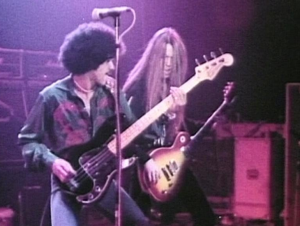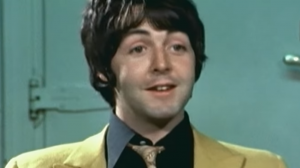Famous Musicians Who Died Broke

via BetaClassics / Youtube
The rock and roll lifestyle conjures images of immense wealth: screaming fans, endless touring, and a life of luxury beyond imagination. From blue-collar heroes like Jon Bon Jovi, who went from singing about working-class struggles to owning an arena football team, to the countless musicians who’ve lived the life of excess, financial security seems to be a guaranteed perk of musical fame.
However, the path to riches can be a one-way street paved with poor decisions. Despite the millions raked in, a surprising number of music legends have found themselves back at square one, their fortunes squandered through mismanagement or indulgence. This article explores the cautionary tales of these fallen stars, musicians who went from chart-topping fame to a financial finale that wouldn’t impress even a struggling artist.
Gregory Coleman
The Winstons, an R&B group whose single “Color Him Father” reached the top 10 in 1969, might not be a familiar name today. Though the group disbanded before achieving major fame, their B-side instrumental, “Amen Brother”, held an unexpected fate. A brief drum solo by the band’s drummer, Gregory Coleman, became a breakout sample in the mid-80s.
This six-second snippet, known as the “Amen Break”, has been sampled countless times, forming the foundation of drum and bass and jungle music. Tragically, Coleman never received royalties for his work. He died broke and homeless in 2006, a stark contrast to the immense impact his drumming had on popular music.
Sammy Davis Jr.
Sammy Davis Jr. defied expectations at every turn. A Black man with one eye, he rose to superstardom during segregation, charming audiences with his smooth moves and talent. He was part of the Rat Pack, hobnobbing with Hollywood royalty, a recording artist with hits, and even a Jewish convert who married a Swedish model. He was a true original who walked his own path with undeniable style.
However, despite his immense success, Davis’ life ended on a tragic note. He died in 1990 deeply in debt to the IRS. In an ironic twist, a stolen driver’s license led authorities to a storage locker filled with Davis’ valuables – instruments, a jukebox, and memorabilia. The IRS seized the items, a sad coda to the life of a complex and captivating entertainer.
https://twitter.com/Dear_Lonely1/status/1774561751692193879
Harry Nilsson
Harry Nilsson was a songwriting genius behind classics like “I Guess the Lord Must Be in New York City” and “One”. He also excelled at reinterpreting others’ work, with his versions of “Everybody’s Talkin'” (Midnight Cowboy) and “Without You” becoming huge hits. A friend of John Lennon and the creator of the children’s special “The Point”, Nilsson’s career was sadly marred by a fraudulent manager who stole millions.
This theft left Nilsson and his large family financially devastated. Despite filing for bankruptcy, they faced constant pressure from creditors. Tragically, Nilsson passed away from heart failure in 1994 at just 52. His fear of financial ruin, documented in a letter to the court, makes it hard to ignore the potential impact of this stress on his early death.
https://twitter.com/IcarFaem/status/1774765685391905114
David Williams
David Williams was a session guitarist who quietly shaped some of the biggest hits of all time. Starting young, he played with legends like The Dells and The Temptations. His career skyrocketed after catching the eye of producer Quincy Jones, who brought him in to record on Michael Jackson’s “Off the Wall” and the record-breaking “Thriller”. Williams’ funky riffs are all over “Billie Jean”, and his talents graced albums by superstars like Stevie Nicks, Paul McCartney, and Madonna.
Tragically, Williams faced financial difficulties later in life. After a medical emergency in 2009, his family reported inadequate care due to lack of insurance. A family friend lamented that Williams, who supported countless stars onstage, received little support himself. He passed away in the hospital at 58, a sad end for a musical contributor who deserved better.
Marvin Gaye
Marvin Gaye’s death was a heartbreaking end to a turbulent life. Despite battling drug addiction, financial struggles, and career woes, he was experiencing a comeback with his hit song “Sexual Healing” in 1983. Sadly, in April 1984, a violent argument with his father turned deadly. Marvin Sr. shot and killed his son just a day before his 45th birthday.
Despite years of success, Gaye died with nothing left. His financial problems were so severe that the extent of his debt wasn’t even fully understood. His only legacy to his 18-year-old son was a court order allowing him to attempt to pay off outstanding bills with nonexistent assets – a tragic reality for a musical legend.
https://twitter.com/BeaconPurple/status/1774748583662678191
Billie Holiday
Billie Holiday’s life was a whirlwind of hardship and triumph. Rising from poverty and defying racial barriers, she became a legendary vocalist in the 1930s and 40s. Her autobiography, Lady Sings the Blues, chronicles this incredible journey. Holiday’s powerful voice tackled social issues head-on, with her song “Strange Fruit” becoming a haunting condemnation of racism.
However, this same racism fueled her tragic demise. Targeted by the FBI’s racially biased drug crackdown, Holiday battled heroin addiction that ravaged her health and career. Despite harassment even on her deathbed, she died at just 44, leaving behind only a small sum of money intended for her caregivers. Her story remains a testament to her talent and a stark reminder of the injustices she faced.
Whitney Houston
Whitney Houston’s voice was a generational treasure. Her self-titled debut album shattered records, and throughout the 80s, she dominated the charts with her powerful vocals. Awards and accolades followed, solidifying her superstar status. However, her marriage to Bobby Brown and battles with addiction cast a shadow over her personal and financial life.
Tragically, Whitney Houston passed away in 2012 at the age of 48. Despite her immense talent and past success, she left behind a mountain of debt that dwarfed the initial estimates of her estate’s value. Ironically, in the years following her death, her estate has grown significantly, enough to pay off all her debts and leave a lasting legacy for her loved ones.
Andy Gibb
Andy Gibb, younger brother of the Bee Gees, rose to disco stardom in the late 70s. His songwriting brother, Barry, helped him achieve a record-breaking feat: the first male solo artist with three consecutive #1 hits. Andy even explored acting on TV and Broadway. However, the 80s brought a harsh turn. His career declined, and a crippling cocaine addiction drained him financially. By 1987, he filed for bankruptcy.
Despite overcoming his addiction, tragedy struck. Years of drug abuse weakened his heart. In 1988, after a brief illness, he died of heart inflammation at the young age of 30. A promising career cut short by a life battling his demons.
Lucky Thompson
Saxophonist Lucky Thompson wasn’t lucky in name, but in talent. He jammed with jazz greats like Dizzy Gillespie and Charlie Parker, played with Count Basie’s Orchestra, and even backed legends like Miles Davis and Thelonious Monk. He released his own music and taught at Dartmouth, but by the mid-70s, he vanished from the scene.
Thompson was known for distrusting the music industry. The next decade remains a mystery, with reports suggesting he became homeless, wandering the countryside and staying with friends. He reportedly spent years without even owning his saxophone. In 1994, he moved to assisted living in Seattle, where he lived until his passing in 2005 at 81.
Woody Herman
Woody Herman was a big band leader who dominated the music scene in the 40s. His “First Herd” churned out classics like “Northwest Passage” and “Caldonia,” and he continued innovating with new bands through the decades, even incorporating rock influences. He won three Grammys and celebrated his 40th anniversary as a leader at Carnegie Hall in 1976.
Tragically, Herman’s success was undermined by a bad manager in the 70s. Unpaid taxes on his band’s salaries left him financially strapped. Forced to tour well past retirement to pay the debt, his health suffered. He eventually handed over band duties and sadly passed away from emphysema and pneumonia in 1987 at 74.
Jaco Pastorius
Jaco Pastorius was a revolutionary bass player. His virtuosic fretless technique and genre-bending style, blending melody with rhythm, made him a standout. He collaborated with greats like Joni Mitchell and Weather Report, even launching his own acclaimed solo career in 1976.
Tragically, mental health struggles and substance abuse began to impact his career in the early 80s. Unreliable behavior and public incidents damaged his reputation. By 1987, his health and finances had deteriorated, leading him to live on the streets. A fight with a bouncer at a nightclub resulted in a head injury, coma, and ultimately his death at the young age of 35.
Michael Jackson
Michael Jackson’s immense success as the “King of Pop” might make it surprising to learn he faced financial difficulties. His extravagant lifestyle, including Neverland Ranch and unusual purchases, contributed to a massive debt. Jackson, only 50 at the time of his death in 2009, was preparing for a comeback tour to potentially alleviate this burden.
Tragically, insomnia led him to seek treatment from Dr. Conrad Murray, who ultimately caused his death by administering a fatal dose of powerful drugs. Jackson’s financial situation was further revealed during a wrongful death lawsuit. Experts testified that his spending habits had left him hundreds of millions of dollars in debt. It took years for his estate to settle these obligations after his passing.
https://twitter.com/MJJGallery/status/1561763629938069504











